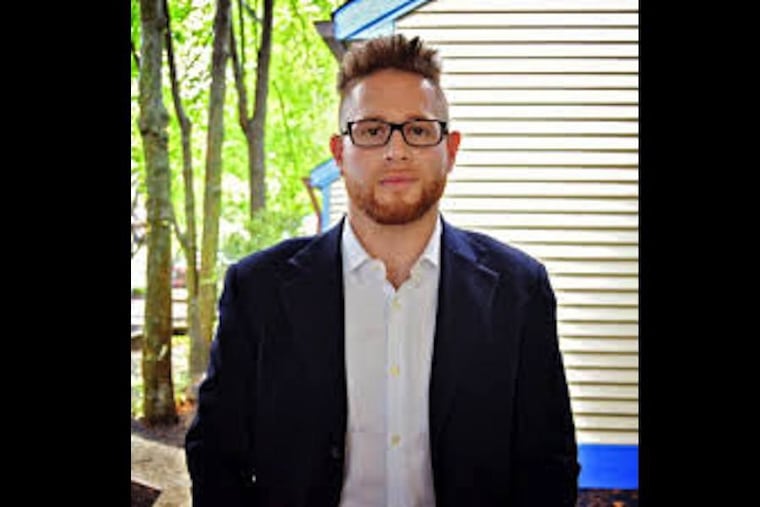Philly-area rehab owner who illegally profited from others’ addictions will spend 18 months in prison
Joseph Lubowitz, ex-CEO of Humble Beginnings Recovery Center, admitted accepting more than $21,000 in kickbacks for referring patients to a Florida rehab center where prosecutors say they were “used like cattle" to generate millions of dollars in fraudulent insurance claims.

A star of the local addiction recovery scene — who emerged from crippling opioid dependence to launch a successful chain of area rehab centers — has been sentenced to 18 months in prison after admitting he illegally profited from the struggles of the patients he had pledged to help.
Joseph Lubowitz, former CEO of Humble Beginnings Recovery Centers in Willow Grove and Cherry Hill, apologized for his transgressions during a federal court hearing Friday in Palm Beach County, Fla., and attempted to convince a judge that he was serious about making amends.
Alone and facing a future behind bars, the 31-year-old Ambler resident cut a far different figure from the man who just a few years earlier had confidently fielded speaking invitations from community groups and elected officials eager to highlight his success story.
Lubowitz’s sentencing comes six months after he pleaded guilty to one count of conspiracy to commit health-care fraud, admitting he had accepted more than $21,000 in kickbacks for sending his patients to recovery facilities in Delray Beach, Fla., including one run by the sponsor who helped him beat his own addiction eight years ago.
That center, Real Life Recovery, and an associated sober-living home, Halfway There, offered patients free airfare, rent, and other perks while ignoring rampant drug use and using clients “like cattle” for their urine samples, submitted for frequent, pricey, and unnecessary drug tests.
Patients were subjected to urine testing as often as four times a week, each costing their insurance company as much as $9,000. One woman was tested 11 times in about a month, with results showing continued drug use. In all, the facilities billed her insurance more than $488,000 for urine testing and other services.
Prosecutors said the facility’s owner, Eric Snyder, netted more than $4 million between 2011 and 2015.
“Patients’ urine was the ‘liquid gold’ used to earn the scheme’s illegal gains,” Assistant U.S. Attorney James V. Hayes wrote in a court filing this year that accused Lubowitz, Snyder, and two codefendants of profiting off “young, addicted, vulnerable, and desperate individuals.”
In a letter submitted to U.S. District Judge Robin Rosenberg before his sentencing, Lubowitz said he had always suspected that the work he had done for Snyder would come back to haunt him. When it began, he said, he was just four months clean and working as a house manager at one of Snyder’s facilities.
Snyder approached him and asked if he wanted to start making “real money.” Within weeks, Lubowitz had moved back to Philadelphia and was referring drug-addicted patients from Pennsylvania and New Jersey in exchange for cash.
“I was a little hesitant at the time because of the way it was presented,” Lubowitz’s letter said. “But he explained to me that everything was aboveboard and there was nothing wrong with helping people and making money.”
While he was participating in the scheme that would eventually send him to prison, Lubowitz launched Humble Beginnings, his own successful rehab center, in the Philadelphia area, and his prominence was rising in the region’s recovery community.
Before his 2018 arrest, he routinely accepted speaking invitations from leaders including Pennsylvania Attorney General Josh Shapiro, eager to tout their own initiatives to stem the state’s opioid crisis by highlighting Lubowitz’s success.
A former varsity athlete at Upper Dublin High School, he spoke engagingly about his high school addiction to alcohol and marijuana, which progressed to pain pills and heroin in college and early adulthood.
And in recognition of that story, Shapiro, from Montgomery County, chose the Upper Dublin football field as the location for a splashy 2017 news conference at which he announced a high-profile investigation into the way drug companies market and sell opioid painkillers.
But even as Lubowitz stood alongside the attorney general and other recovery advocates that day, federal authorities in Florida were preparing their case.
In court filings leading up to Friday’s sentencing, Lubowitz’s attorney, Edward Shohat, maintained that his client did not participate in Real Life Recovery’s urine-testing schemes and had nothing to do with Snyder’s insurance fraud.
Still, he acknowledged that Lubowitz had violated Florida’s patient brokering laws and described his reckoning with those crimes in terms of a second recovery.
Lubowitz made bad choices, struggled to free himself from their consequences, ultimately acknowledged his errors, and is trying to rebuild his life, the lawyer said.
Now the father of a 1-year-old son, he is working as chief operating officer for a franchise of Tony Roni’s Neighborhood Kitchen restaurants in the suburbs, and continues to mentor drug-addicted patients in 12-step programs and Narcotics Anonymous.
“He is a public crusader against addiction,” Shohat said. “He is at the cusp of a new, very productive career. There is no good reason this far removed temporally and substantively from his crimes to remove him from his productive life.”
In the end, the judge appeared to agree. The 18-month sentence Rosenberg imposed was less than what federal sentencing guidelines had recommended in Lubowitz’s case and far shorter than the 10-year sentence Snyder received.
In addition to his prison term, Lubowitz must pay more than $80,000 in restitution.
“You are not a bad person,” Rosenberg told him at the hearing, according to the Palm Beach Post. “You made a bad mistake, and it has consequences.”